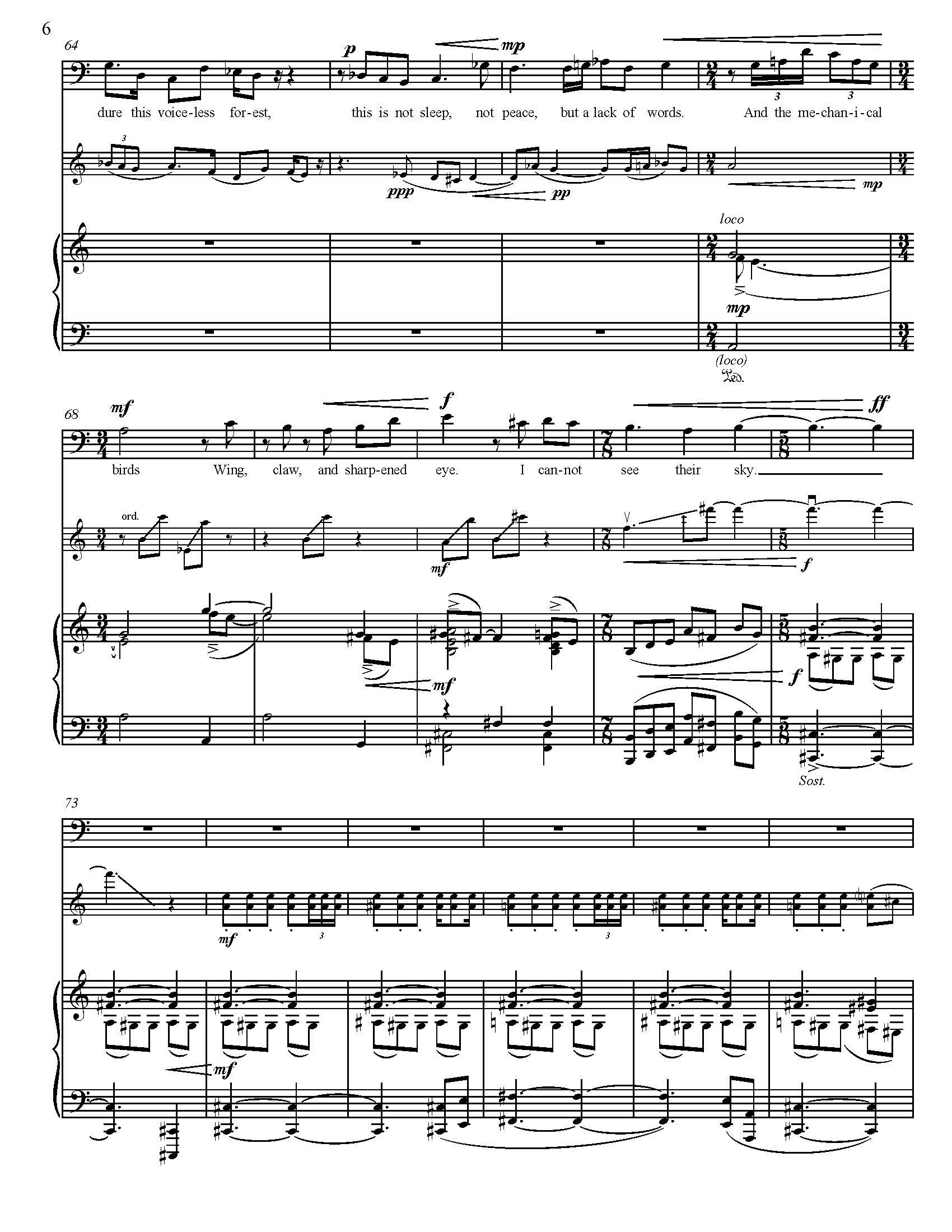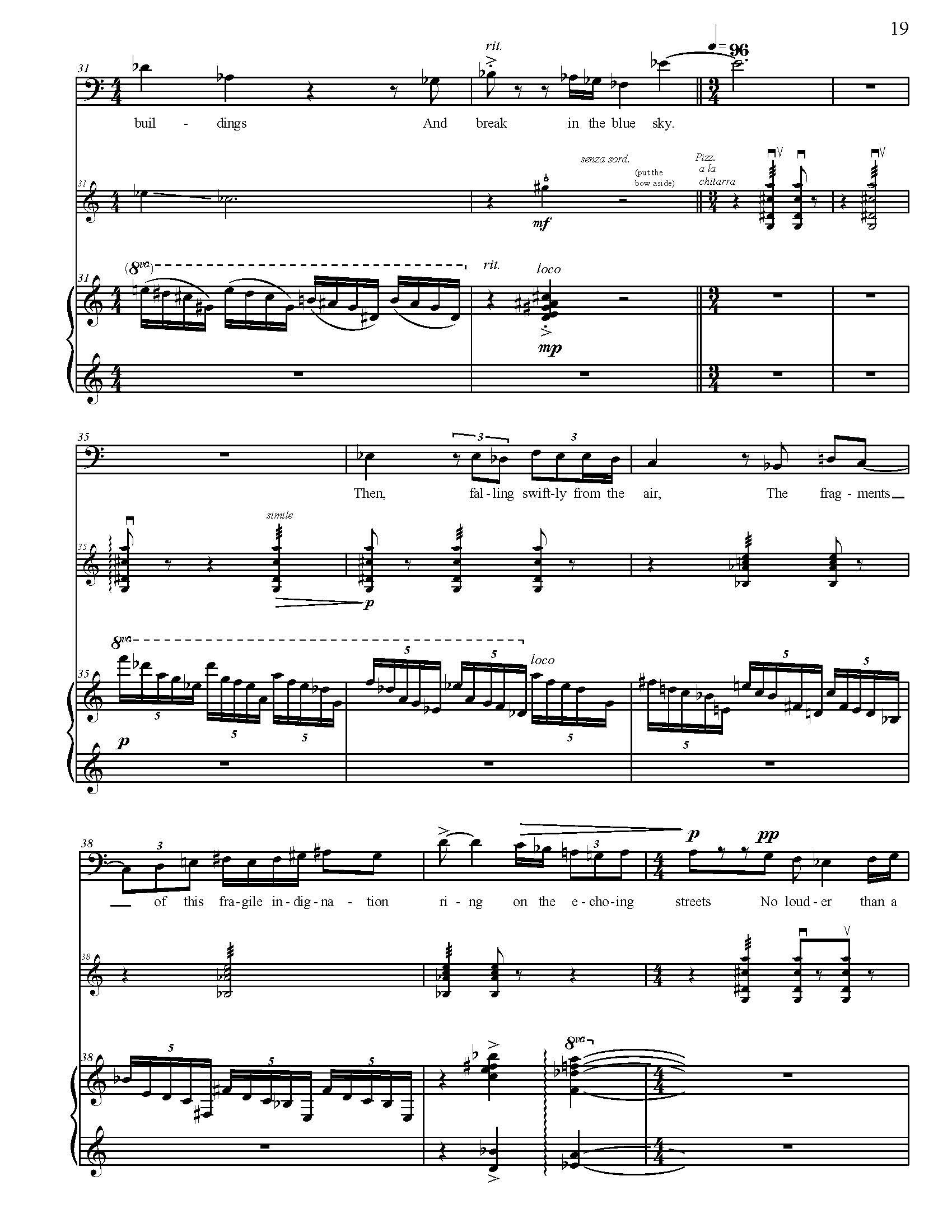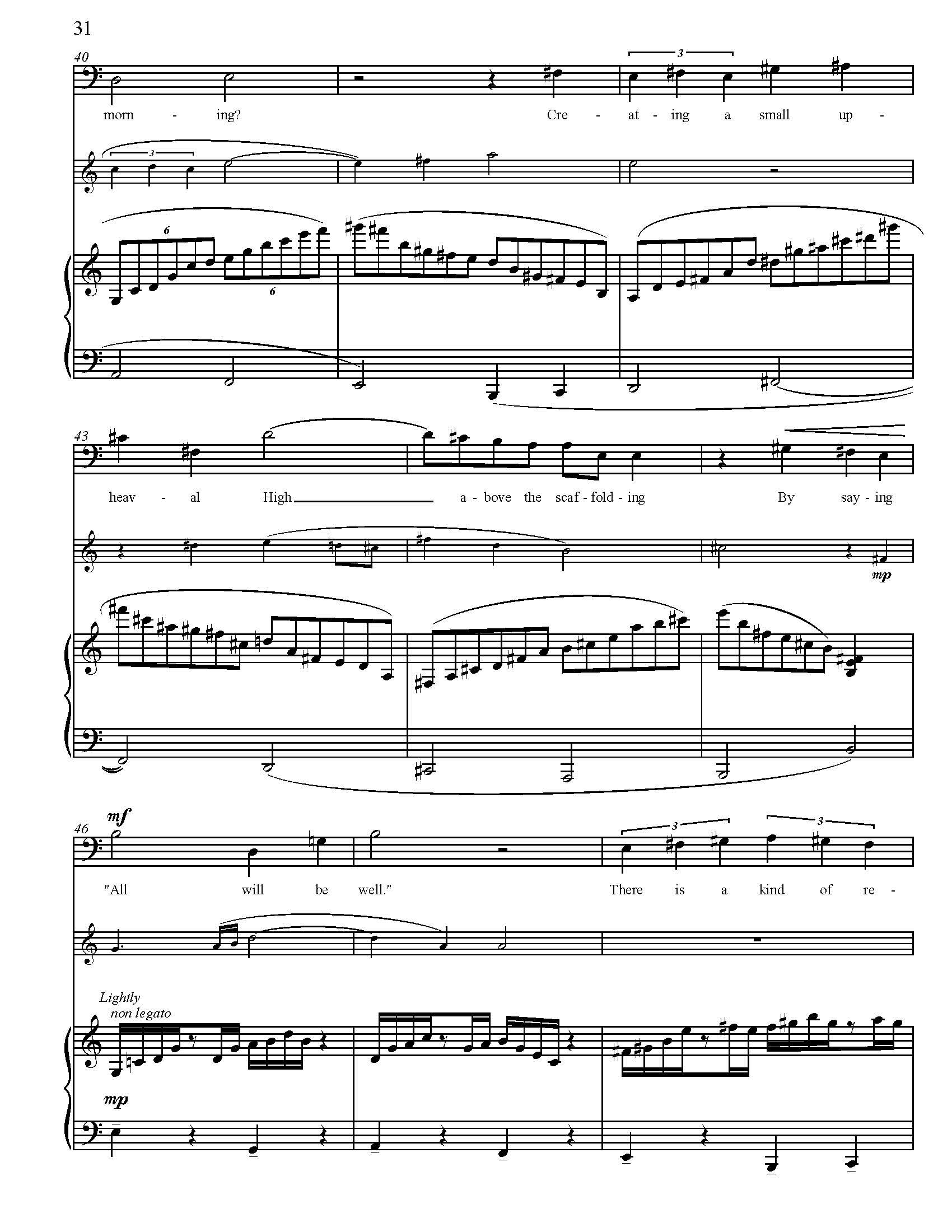The Persistence of Song
For baritone, violin, and piano (2006), 21’30”
Text: Muriel Rukeyser, Thomas Merton, Howard Moss, Bonnie Phelps
Commissioned and Premiered by C4 and the Fireworks Ensemble in May 2012.
Program Notes
The cycle, The Persistence of Song, arose out of several collaborations between the Orfeo Duo (Vita Wallace, violin, and Ishmael Wallace, piano) and myself (as conductor of the chamber chorus, Howl!) in the adjacent neighborhoods of Morningside Heights and Manhattanville, which includes much of lower West Harlem as well as Columbia University in NYC. The poets represented live(d) in or had a considerable association with these neighborhoods. Our baritone, Daniel Neer, premiered the work in 2006.
The work runs both cyclically and linearly. It travels from midnight around the clock to next day’s dusk. It also journeys from the deep shadows of utter loneliness all the way to the promise of a glorious sunset. Yet a third architecture is determined by the arch-shaped third movement, infused into the cycle as a whole. Movements 1 & 5, and 2 & 4, provide mirrors of each other not only in musical elements but also their poetic settings: 1 & 5 in the country, 2 & 4, in the city. The pivotal middle movement’s setting is, appropriately, place-neutral or, all-encompassing.
Muriel Rukeyser’s A Child in the Great Wood could hardly be any darker, suffused with existential gloom and loneliness. It’s a sketch tragedy, replete with multiple extended techniques on the violin, and an ironic falsetto.
The dawn of Thomas Merton’s Aubade—The City brings no relief, merely a more sun-seared misery, as we are thrust into unwanted human contact and the drudgery of the urban morning. The violin’s commentary features piercing glissandi and bristly strumming.
The titular The Persistence of Song is, naturally, the heart of the cycle. Howard Moss’s text shimmers joyfully, without commentary. It is also a palindrome, reading the same forwards as backwards. The accompaniment is in the form of a chaconne, a set of variations based on a repeated chord progression. (The bass line is pre-determined in the first movement intro.) Following a pivot the progression is reversed and the variations presented from last to first.
Bonnie Phelps’s “umbrella” gem is now worlds away from the anxiety of the forest and the stressed city morning. The gentleman is at peace within an otherwise uncomfortable situation. The violin presents some tone painting with its repeated pizzicato notes (see Chopin’s “raindrop” prelude) and doesn’t play with the bow until right before the final revealing line.
The last movement is the flipside of Merton’s blinding morning, a glorious slide into Evening. The promise of hope in this “darkness into light” cycle is thus sunset rather than the expected sunrise. The children’s visions are reflected in music of innocence and exuberance. After the darkness and nuances of the preceding movements, the voice and instruments here truly break free and the effect is of uninhibited joy.
Mvt. 5: Evening
The Persistence of Song
Muriel Rukeyser, Thomas Merton, Howard Moss, Bonnie Phelps
III. The Persistence of Song
Although it is not yet evening,
The secretaries have changed their frocks
As if it were time for dancing,
And locked up in the scholars’ books
There is a kind of rejoicing,
There is a kind of singing
That even the dark stone canyon makes
As though all fountains were going
At once, and the color flowed from bricks
In one wild, lit upsurging.
What is the weather doing?
And who arrived on a scallop shell
With the smell of the sea this morning?
--Creating a small upheaval
High above the scaffolding
By saying, “All will be well.
There is a kind of rejoicing.”
Is there a kind of rejoicing
In saying, “All will be well”?
High above the scaffolding,
Creating a small upheaval,
The smell of the sea this morning
Arrived on a scallop shell
What was the weather doing?
In one wild, lit upsurging?
At once, the color flowed from bricks
As though all fountains were going,
And even the dark stone canyon makes
Here a kind of singing,
And there a kind of rejoicing,
And locked up in the scholars’ books
There is a time for dancing
When the secretaries have changed their frocks,
And though it is not yet evening,
There is the persistence of song.
- Howard Moss. Text reprinted with permission.
IV. Tribute to the Young Man Without his Umbrella
So well groomed in his
Bright white shirt
Jeans pressed to perfection
His blackened boots
Cowboyed
Soft-shined and silver-tipped
Blond hair brushed—smoothed
His youthful face serious
Yet—so serene as he
Moved without a wrinkle
Between God’s tear
Exhibiting none of our
Usual urban annoyanc
Over his forgotten umbrella.
- Bonnie Phelps. Text reprinted with permission.
V. Evening
Now, in the middle of the limpid evening,
The moon speaks clearly to the hill.
The wheatfields make their simple music,
Praise the quiet sky.
And down the road, the way the stars come home,
The cries of children
Play on the empty air, a mile of more,
And fall on our deserted hearing,
Clear as water.
They say the sky is made of glass,
They say the smiling moon’s a bride.
They say they love the orchards and apple trees,
The trees, their innocent sisters, dressed in blossoms,
Still wearing, in the blurring dusk,
White dresses from that morning’s first communion.
And, where blue heaven’s fading fire last shines
They name the new come planets
With words that flower
On little voices, light as stems of lilies.
And, where blue heaven’s fading fire last shines
Reflected in the poplar’s ripple,
One little, wakeful bird
Sings like a shower.
I. A Child in the Great Wood
It is all much worse than I dreamed
The trees are all here,
Trunk, limb, and leaf,
Nothing beyond belief
In danger’s atmosphere
And the underbrush is cursed
But the animals,
Some are as I have dreamed,
Appear and do their worst
Until more animals
With recognizable faces
Arrive and take their places
And do their worst.
It is all a little like dreaming,
But this forest is silent,
This acts out anxiety
In a midnight stillness.
My blood that sparkles in me
Cannot endure this voiceless
Forest, this is not sleep
Not peace but a lack of words.
And the mechanical birds
Wing, claw, and sharpened eye.
I cannot see their sky.
Even this war is not unlike the dream,
But in the dream-war there were armies,
Armies and armor and death’s etiquette,
Here there are no troops and no protection,
Only this wrestling of the heart
And a demon-song that goes
For sensual friction
Is largely fiction
And partly fact
And so is tact
And so is love,
And so is love.
The thin leaves chatter. There is a sound at last
Begun at last by the demon-song.
Behind the wildest trees I see the men together
Confessing their lives and the women together.
But really I cannot hear the words. I cannot hear the song.
This may still be my dream
But the night seems very long.
- Muriel Rukeyser. Used by Permission. All rights reserved.
II. Aubade—The City
Now that the clouds have come like cattle
To the cold waters of the city’s river,
All the windows turn their scandalized expression
Toward the tide’s tin dazzle,
And question, with their weak-eyed stare,
The riotous sun.
From several places at a time
Cries of defiance,
As delicate as frost, as sharp as glass,
Rise from the porcelain buildings
And break in the blue sky.
Then, falling swiftly from the air,
The fragments of this fragile indignation
Ring on the echoing streets
No louder than a shower of pins.
But suddenly the bridges’ choiring cables
Jangle gently in the wind
And play like quiet piano-strings.
All down the faces of the buildings
Windows begin to close
Like figures in a long division.
Those whose eyes all night have simulated sleep,
Suddenly stare, from where they lie, like wolves,
Tied in the tangle of the bedding,
And listen for the waking blood
To flood the apprehensive silence of their flesh.
They fear the heart now lies quenched may
quicken,
And start to romp against the rib,
Soft and insistent as a secret bell.
They also fear the light will grow
Into the windows of their hiding places, like a tree
Of tropical flowers
And put them, one by one, to flight.
Then life will have to begin.
Pieces of paper, lying in the streets,
Will start up, in the twisting wind,
And fly like idiot birds before the faces of the crowds.
And in the roaring buildings
Elevator doors will have begun
To clash like sabres.
- By Thomas Merton, from THE COLLECTED POEMS OF THOMAS MERTON, copyright © 1948 by New Directions Publishing Corporation, 1977 by The Trustees of the Merton Legacy Trust. Reprinted by permission of New Directions Publishing Corp.
“While David does have a gift for melody, it is rarely melody for the sake of its own attractiveness, but rather to underline an emotion or amplify a picture.”
- Henry Fogel, Fanfare, review of The Persistence of Song











